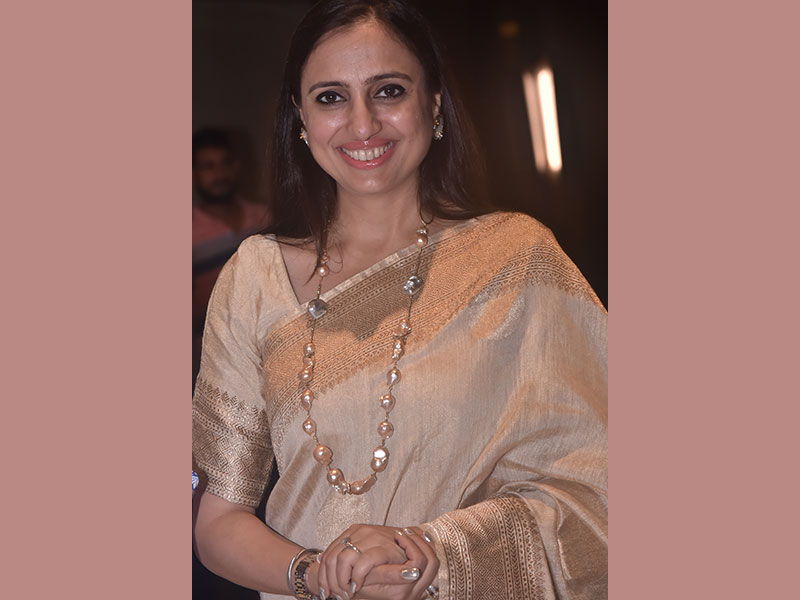 Chasing Love
Chasing Love
PKF's 3-day boutique festival of love enriches Valentine's Day season with literary ferment
Valentine's Day was perfect for an exclusive festival on love, Chasing Love, presented by the Prabha Khaitan Foundation. The 3-day virtual boutique literature festival was online thanks to the pandemic and was pre-recorded for a seamless quality watch. The seven sessions with 26 speakers was curated by author and literature festival director Shinie Antony.
Day One kicked off with a recitation by actor Sharmila Tagore who chose to read one of the letters written by novelist-painter Zelda Fitzgerald to her husband Scott Fitzgerald, an eminent author. Tagore, sitting in her well-appointed study, read out the letter written by Zelda in 1939 from the sanatorium where she was hospitalized.
As Tagore explained, the letter was an expression of Zelda’s love and need for her husband as well as her frustrations for being so isolated. “That feeling of isolation some of us may know because in these lockdowns we have experienced it,” Tagore said.
The passionate recitation was followed by a sneak peek of the book ‘Write me a Love Story’ by author Ravinder Singh, who is also known as the King of Indian romance writing.
In a session with journalist Rashmi Menon, Singh spoke of his roles as an author of nine bestseller romances and as the founder of BlackInk publishing house. “The real Ravinder is the boy next-door who has his own perspective, is very emotional, rebellious, logical and writes love stories,” he said.
Singh said he decided to have a vertical integration of the idea of romance and erotica into his latest book, dubbing the attempt as challenging and adventurous.
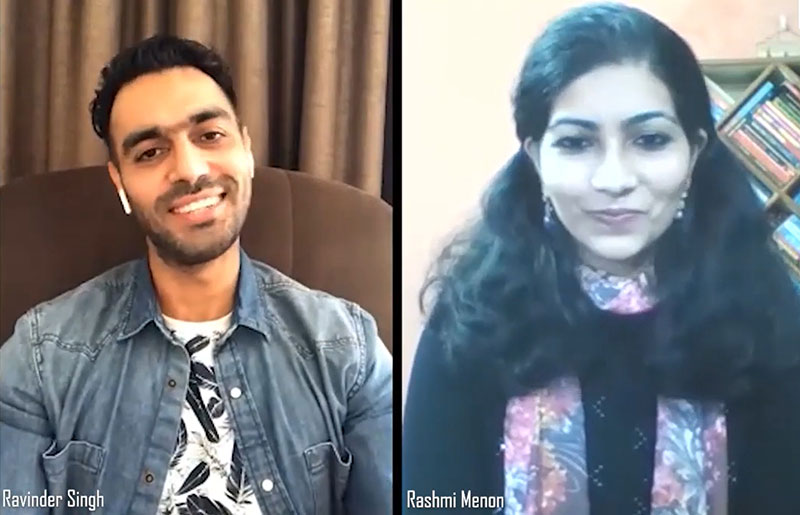
There were two other sessions on Day One; In 70 MM and When it’s Magic. Filmmaker and author Ashwiny Iyer Tiwari of Bareily Ki Barfi fame, actor and children books author Jugal Hansraj, journalist Kaveri Bamzai discussed pivotal scenes and songs that represent love in the session In 70 MM led by RJ Stutee Ghosh.
Hansraj commented on how the portrayal of love on screen has completely changed moving with the times. “Earlier there was a typical kind of love story format with the boy and girl with types like the playboy,” he said. “But now instead of types, the roles have become more character driven.”
Talking about her debut book Mapping Love, Iyer dubbed Mumbai, the city where cinema happens, as a lonely city. “We are all so busy in our lives that we don’t have time to talk. Even our phone calls have been converted into messages.”
Bamzai commented on the making of love stories, “When you make a love story you have to suspend your sense of judgment to a certain extent.” Ghosh spoke of how “suddenly (in the films) women are talking about what they find attractive”. As she said, “Now we have more women writing films, making films, consuming them and saying what they actually like.”
The session When it’s Magic was all about ‘dangerous love’ as author K R Meera said, “All my life I had been dreaming of a very dangerous, very impossible love. I think only that would thrill me even now.” She was in conversation with author Nisha Susan who has translated Meera’s book Qabar.
She said, “As I was working on the translation, I kept thinking that what is happening in the book is so fascinating because the history of Hindus and Muslims are tied and cannot be separated but the history of men and women seem to be on two different planets which seem to rotate on separate axes.”
Day Two had author-columnist Shobhaa De in conversation with author Kiran Manral. De spoke about her latest book Lockdown Liaisons, a collection of short stories, which was “a desperate response to a desperate situation”. Calling herself a chronicler of her times, De said it was important for her to chronicle the pandemic times.
She said, “I felt a connection with stories of relationships that were breaking up because of the situation and unplanned developments in people’s lives which were directly impacted by a virus thousands of miles that had taken over the world.”
Writers Anukrti Upadhyay, Jahnavi Barua, Madhavi Menon, Nandita Bose and Madhavi S Mahadevan were on the session The Forbidden Territory which focused on, what Mahadevan called, Holy Grail or forbidden love.

Upadhyay commented on the popularity of the not happily-ever-after stories, “I have often wondered why we take pleasure in sad stories. Maybe because it’s a story, it takes the sting out of the sadness, out of the tragedy. While we are reading, we are immersed in the story but are also aware that it’s somebody’s imagination.”
Barua commented, “The path to happiness is what interests us and more so, if the path is full of dangers, obstacles and we do a rollercoaster ride with the protagonist.” Menon added: “What we recognize in these stories, whether it is Romeo Juliet or Heer Ranjha, is that there is something to love that leads much more to death than to a happily-ever-after.” Bose spoke from the gender perspective, saying, “When we are talking about forbidden, what is forbidden among genders differ.”
Day Three of Chasing Love saw two sessions – Kal, Aaj Aur Kal and Dating Shating with an array of authors. The first session was appealing to all those who like to read romance. The speakers were: Andaleeb Wajid, Milan Vohra, Prajwal Hegde, Reena I Puri and Anuja Chandramouli.
Wajid said, “Writing my romance novels is an escape for me because sometimes life gets too much and when I am writing a romance I am in control of the world and at the end of it all there is a happy ending.”
Puri, who is the editor-in-chief of Amar Chitra Katha, said, “A lot of our puranas and stories of the past have very vivid love stories and sexual descriptions which we have to put it to children in a way they will be able to comprehend. These are things which were accepted in the past and nobody found them strange but now people are judging these sorts of behaviours so we have to be very careful when putting the stories.”
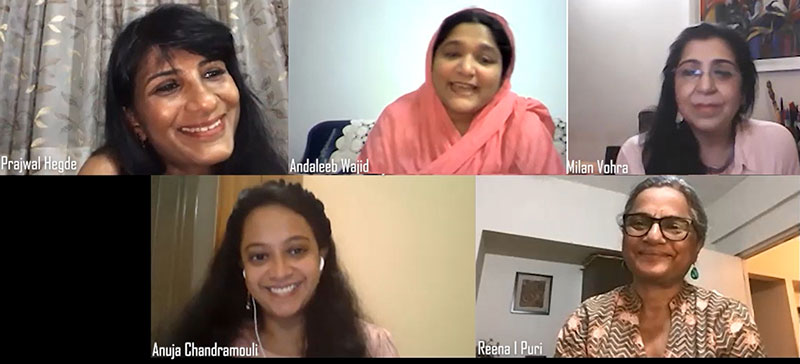
Elaborating on romance stories, Hegde said, “I would like to think of these stories as life stories rather than love stories because they are about a person’s journey.” Vohra, who has written Mills and Boon kind of romances, said, “Love has now become so goal-oriented and transactional that I wouldn’t even question if it’s love or not, because for that person it is, even if they are on dating apps. The whole highs and lows – the journey is similar to love.” Chandramouli opined, “It’s love that gives life its intense flavour and makes it more fulfilling.”
The last session of the boutique festival was also the one served with dollops of humour. Six speakers, well-known names in the field of funny, Zac O’Yeah, Anuja Chauhan, Rubi Chakravarti, G Sampath and Anuvab Pal, were in a freewheeling conversation with Shinie Antony.
They talked of the nuances of love, romance and dating. Debating on whether they get or give roses, standup comedian and novelist Pal said, “I don’t get many roses on a regular basis but I feel that roses had a decade, for instance in the 80s there were roses, even TV ads had roses. I feel like 2022 is not the era of roses. I don’t know why I feel that way. If you are asking me on Valentine’s Day what people give each other, I have no idea.”
Chauhan commented, “When you say roses, I do associate them with the street urchins. They will always come at the traffic lights and somehow, they can tell I am a sucker and I come back with a bunch of roses simply because they are so persuasive. I don’t associate roses with romance but I do love the scent of roses.”
Chakravarti declared, “I have no association with roses and I never did. I do feel giving roses to someone is taking zero effort.”
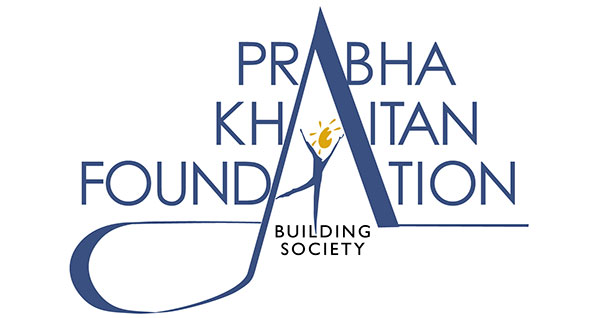
Sampath, on the other hand, said, “I do like roses but I dislike physical flowers because they create all kinds of problems. You have to keep them somewhere; you have to find water for them or else they will die. So, I like roses which are emojis.”
Zac had another humorous take, saying, “If a married man gives roses to his wife it would lead to all kinds of suspicions about affairs and what have you done to my fixed deposits followed by divorce proceedings.”
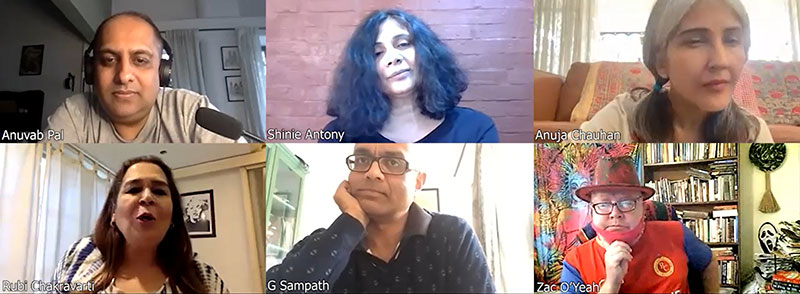
Talking about the festival Ms Vinnie Kakkar, National Advisor of Prabha Khaitan Foundation, said: "This Valentine’s Day, we from the Foundation explored into the realms of romance, desires, fantasies, dream, and magic with Chasing Love. The online 3-day long Boutique literature Festival on Love had the best authors and minds talk about their perspectives of love and desire and about their books in conversation with the best names in the literary and cultural world."
Chasing Love was indeed an experience cherished by our patrons and eminent audience.
Support Our Journalism
We cannot do without you.. your contribution supports unbiased journalism
IBNS is not driven by any ism- not wokeism, not racism, not skewed secularism, not hyper right-wing or left liberal ideals, nor by any hardline religious beliefs or hyper nationalism. We want to serve you good old objective news, as they are. We do not judge or preach. We let people decide for themselves. We only try to present factual and well-sourced news.







